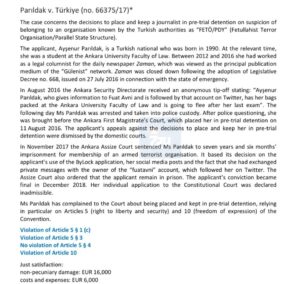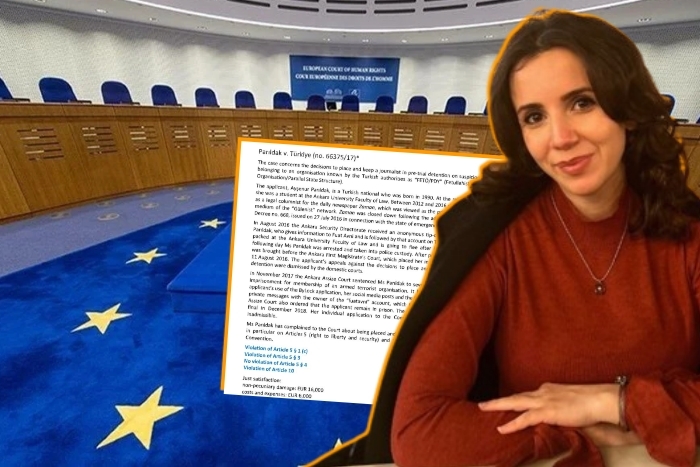Fatma Zibak
The European Court of Human Rights (ECtHR) has faulted Turkey over the pretrial detention of Ayşenur Parıldak, a reporter for the now-closed Zaman daily, following a failed coup in Turkey in 2016 due to her alleged links to the faith-based Gülen movement, finding an absence of sufficient grounds for her detention.
The Strasbourg court announced its ruling on Parıldak, 34, on Tuesday, finding violations of Article 5 (right to liberty and security) and Article 10 (freedom of expression) of the European Convention on Human Rights (ECHR) on account of the absence of sufficient grounds for ordering and keeping her in pretrial detention and the excessive duration of her pretrial detention.
The court ordered Turkey to pay the journalist 16,000 euros in non-pecuniary damages and an additional 6,000 euros for legal costs and expenses.

The ECtHR made its ruling with a majority of votes. While six of the judges who reviewed Parıldak’s case agreed on the violation of her rights and payment of damages, Turkish judge Saadet Yüksel, who is criticized for acting as the Turkish government’s representative at the court, dissented.
Parıldak’s application concerned her pretrial detention in the aftermath of a coup attempt on July 15, 2016 on suspicion of membership in an alleged terrorist organization, the Gülen movement, accused by the Turkish government of masterminding the failed coup and labeled as a terrorist organization.
The movement, inspired by the views of Turkish-Islamic scholar Fethullah Gülen, denies the accusations.
Parıldak was among the dozens of journalists who were arrested in the aftermath of the failed coup. She worked as a court reporter for the Zaman daily, which was among the dozens of media outlets closed down by the government following the coup attempt due to their affiliation with the Gülen movement. She was also a student at Ankara University’s faculty of law when she was arrested in August 2016.
The journalist stood trial on terror-related charges and was given a prison sentence in November 2017 on charges of membership in a terrorist organization. The court based its ruling on Parıldak’s use of the ByLock smart phone application, her social media posts and the fact that she had exchanged messages with a whistleblower account, named “fuatavni” who followed her on X, formerly Twitter.
ByLock, once widely available online, has been considered a secret tool of communication among supporters of the Gülen movement since the 2016 coup attempt despite the lack of any evidence that ByLock messages were related to the abortive putsch.
Vincent Berger, a Paris-based lawyer who represented Parıldak at the ECtHR, told Turkish Minute in a phone interview that he was delighted about the ECtHR judgement and its content but regretted the fact that it took the ECtHR such a long time to conclude Parıldak’s case.
“This was a mistake,” said Berger, adding that the court concluded the cases of other Turkish journalists who were subjected to similar rights violations several years earlier than Parıldak’s application.
The journalist filed her petition at the ECtHR on August 1, 2017.
In a landmark decision in September, the Grand Chamber of the ECtHR ruled that Turkey had violated three articles of the ECHR in the case of a former teacher, Yüksel Yalçınkaya who among other things was convicted of terrorism in Turkey due to his use of ByLock.
Legal experts said the grand chamber’s decision made clear that use of ByLock cannot be considered criminal evidence against Gülen movement members.
The well-known “fuatavni” account, who provided tips on corruption and unlawful government actions, was followed by over 3 million people and followed 214 people who were not being prosecuted on similar charges.
Parıldak’s sentence was upheld by the Supreme Court of Appeals in 2018 while an individual application she filed at the Constitutional Court was found inadmissible by the court, prompting her to take her case to the ECtHR.
She was released from prison in early 2022 after serving her sentence.
In October 2016 Parıldak wrote a letter to the Cumhuriyet daily from Silivri Prison, saying she had been subjected to solitary confinement and sexual harassment in the prison. Her letter to Cumhuriyet led to a ban on letters being sent from that prison.
In September 2018 she was named recipient of the first Shahnoush Award by the Oslo-based Vigdis Freedom Foundation (VFF), a “woman-to-woman solidarity” group that promises “legal support and counsel to women human rights defenders who have been wrongfully accused and imprisoned and are therefore prisoners of conscience.”
Turkey, one of the world’s top jailers of journalists, is ranked 165th in the Reporters Without Borders (RSF) 2023 World Press Freedom Index, among 180 countries, not far from North Korea, which occupies the bottom of the list.



